11 Best Herbal Tinctures For Upset Stomach
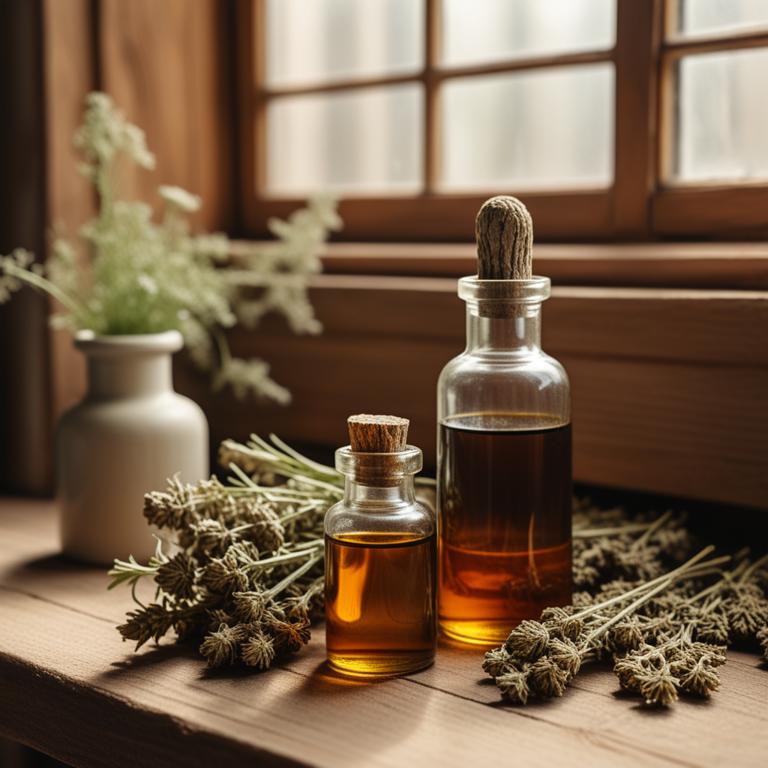
Herbal tinctures for Upset stomach are concentrated plant extracts used to treat digestive issues, typically made by steeping herbs in a solvent such as water or alcohol.
These natural remedies offer several benefits, including quick relief from nausea, bloating, and discomfort, as well as long-term support for gut health.
Popular herbal tinctures for upset stomach include Peppermint, which eases digestive cramps and relaxes the muscles, Ginger, which reduces inflammation and soothes the stomach lining, and Chamomile, which calms the nervous system and promotes relaxation.
Additionally, other effective herbal tinctures include Dandelion Root, which stimulates digestion and reduces bloating, Fennel, which eases gas and indigestion, and Licorice Root, which protects the stomach lining and reduces inflammation.
According to "Clinical gastroenterology and hepatology : the official clinical practice journal of the American Gastroenterological Association", tinctures containing peppermint, in combination with other ingredients, have supportive evidence for use in patients with upset stomach, including irritable bowel syndrome.
Below there's a list of the 11 best herbal tinctures for upset stomach.
- 1. Zingiber officinale tinctures
- 2. Foeniculum vulgare tinctures
- 3. Curcuma longa tinctures
- 4. Cymbopogon citratus tinctures
- 5. Glycyrrhiza glabra tinctures
- 6. Terminalia chebula tinctures
- 7. Glycyrrhiza uralensis tinctures
- 8. Carica papaya tinctures
- 9. Taraxacum officinale tinctures
- 10. Althaea officinalis tinctures
- 11. Anethum graveolens tinctures
Also you may be interested in...
TODAY'S FREE BOUNDLE
Herb Drying Checklist + Herbal Tea Shopping List + Medicinal Herbs Flashcards
Enter you best email address below to receive this bundle (3 product valued $19.95) for FREE + exclusive access to The Aphotecary Letter.
$19.95 -> $0.00
1. Zingiber officinale tinctures

Zingiber officinale tinctures, derived from the rhizome of the ginger plant, have been traditionally used to treat upset stomach ailments due to their anti-inflammatory and carminative properties.
The bioactive constituents of ginger tinctures, such as gingerols and shogaols, help to reduce inflammation and alleviate nausea, thereby providing relief from stomach discomfort.
By stimulating digestive enzymes and improving gut motility, ginger tinctures also help to facilitate the elimination of toxins and reduce the risk of acid reflux.
The benefits of using ginger tinctures to treat upset stomach ailments include rapid symptom relief, reduced risk of complications, and a natural alternative to pharmaceutical medications.
Related Study
According to "Alternative therapies in health and medicine", Zingiber officinale tinctures for upset stomach may be effective in relieving nausea and vomiting in the first trimester of pregnancy, with 77% of subjects experiencing at least a 4-point improvement on the nausea scale after 9 days of treatment.
2. Foeniculum vulgare tinctures
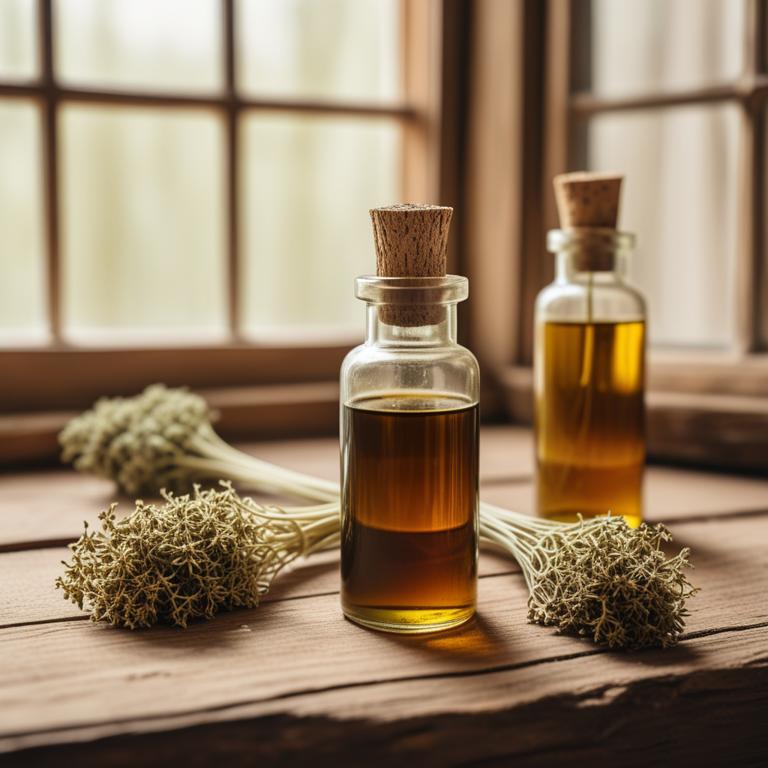
Foeniculum vulgare tinctures have been traditionally used to treat upset stomach ailments, such as indigestion and nausea, due to their anti-inflammatory and antispasmodic properties.
These properties help to reduce inflammation and ease muscle spasms in the digestive tract, thereby alleviating symptoms of an upset stomach.
The bioactive constituents of Foeniculum vulgare tinctures, including volatile oils like anethole and limonene, contribute to its therapeutic effects by relaxing the muscles and reducing inflammation.
By using Foeniculum vulgare tinctures, individuals can experience relief from upset stomach symptoms and promote overall digestive health.
Related Study
According to "International journal of gynaecology and obstetrics: the official organ of the International Federation of Gynaecology and Obstetrics", Foeniculum vulgare tinctures for upset stomach, such as those derived from the fruit of Sweet Fennel, may have a lower potency compared to mefenamic acid in relieving menstrual pain, but it can be used as a safe and effective herbal drug.
3. Curcuma longa tinctures

Curcuma longa tinctures have been traditionally used to treat upset stomach ailments, such as indigestion and nausea, due to their anti-inflammatory and carminative properties.
The bioactive constituents, including curcumin, demethoxycurcumin, and bisdemethoxycurcumin, help to reduce inflammation and alleviate symptoms of stomach upset by inhibiting the production of pro-inflammatory enzymes and cytokines.
Curcuma longa tinctures also help to treat upset stomach by soothing the stomach lining, reducing spasms, and improving digestion, thereby providing relief from symptoms such as bloating, gas, and stomach pain.
The benefits of using Curcuma longa tinctures to treat upset stomach ailments include rapid relief from symptoms, prevention of stomach irritation, and promotion of overall digestive health.
Related Study
According to the study, Curcuma longa tinctures for upset stomach may have potential benefits due to the presence of curcumin, a major active substance within the plant, which may help alleviate pain and discomfort associated with gastrointestinal conditions.
4. Cymbopogon citratus tinctures
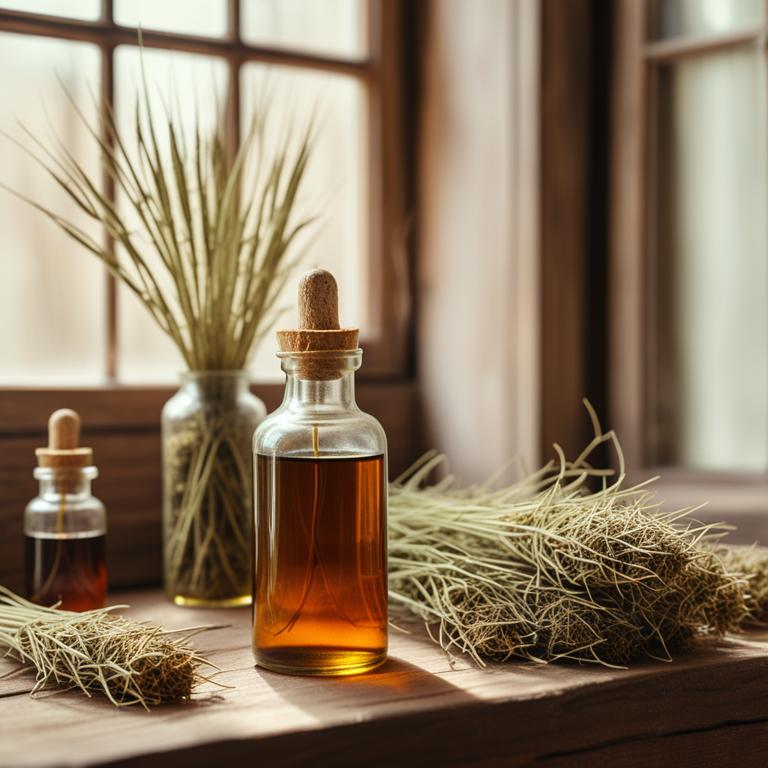
Cymbopogon citratus tinctures, derived from the essential oil of lemongrass, have been traditionally used to treat upset stomach ailments due to their anti-inflammatory and antispasmodic properties.
These properties help to ease digestive discomfort and alleviate symptoms such as nausea and bloating.
The bioactive constituents, including citral and geraniol, in Cymbopogon citratus tinctures have been shown to possess anti-inflammatory and antimicrobial properties, which help to soothe the digestive tract and reduce inflammation.
The benefits of using Cymbopogon citratus tinctures to treat upset stomach ailments include reduced digestive discomfort, improved digestion, and a decrease in the occurrence of nausea and vomiting.
5. Glycyrrhiza glabra tinctures

Glycyrrhiza glabra tinctures, derived from the roots of the licorice plant, are a popular herbal preparation used to treat an upset stomach.
The anti-inflammatory and soothing properties of these tinctures help to calm digestive issues, reducing inflammation and discomfort in the stomach.
The bioactive constituents, including glycyrrhizin and flavonoids, have been shown to have gastroprotective effects, which help to protect the stomach lining from acid damage and promote healing.
The benefits of using Glycyrrhiza glabra tinctures to treat an upset stomach include reduced symptoms of nausea and vomiting, improved digestion, and a decrease in stomach discomfort.
Related Study
According to the given study, Glycyrrhiza glabra tinctures may be beneficial for treating upset stomach as it has potential anti-ulcer activity, one of the medicinal plants listed in the study.
6. Terminalia chebula tinctures
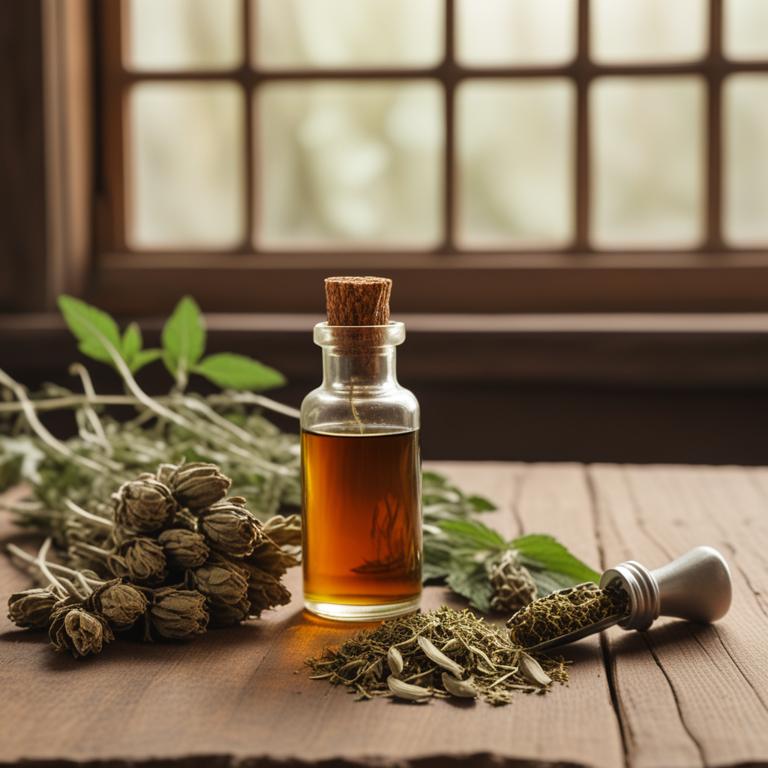
Terminalia chebula tinctures, derived from the ancient Indian medicinal plant, have been traditionally used to treat upset stomach ailments due to its soothing properties that help to calm the digestive system and reduce inflammation.
The bioactive constituents of Terminalia chebula tinctures, including chebulinic acid and corilagin, possess anti-inflammatory and antioxidant properties that help to alleviate stomach discomfort and promote healing.
By regulating digestive enzymes and improving gut health, Terminalia chebula tinctures help to treat upset stomach ailments by reducing symptoms such as nausea, bloating, and diarrhea.
The benefits of using Terminalia chebula tinctures to treat upset stomach ailments include improved digestion, reduced inflammation, and enhanced overall gut health.
Related Study
According to "Journal of postgraduate medicine", Terminalia chebula tinctures for upset stomach may be beneficial in increasing gastric emptying, as the study found that it increased the percent gastric emptying by 86.57 +/- 6.65% (p < 0.01).
7. Glycyrrhiza uralensis tinctures
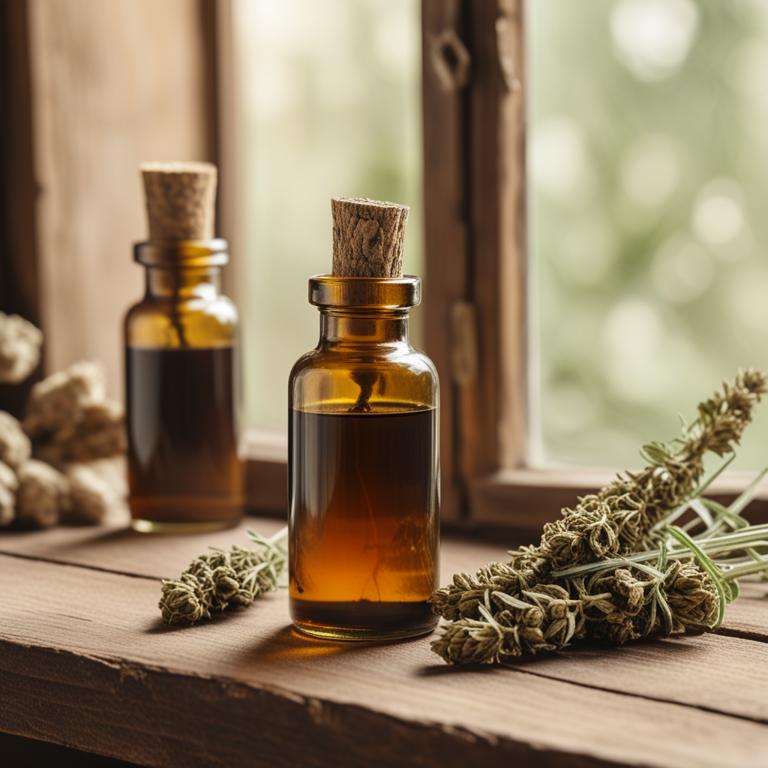
Glycyrrhiza uralensis tinctures, a traditional herbal preparation, have been used to treat upset stomach ailments due to their soothing and anti-inflammatory properties.
The bioactive constituents, including glycyrrhizin, flavonoids, and phenolic acids, help to reduce inflammation, protect the mucous membrane, and alleviate digestive discomfort.
By promoting the healing of the stomach lining and reducing acid production, Glycyrrhiza uralensis tinctures help to treat upset stomach ailments by alleviating symptoms such as nausea, bloating, and abdominal pain.
The benefits of using these tinctures include rapid relief from digestive issues, improved digestion, and a reduced risk of complications associated with stomach ulcers and acid reflux.
8. Carica papaya tinctures

Carica papaya tinctures have been traditionally used to treat upset stomach ailments due to their anti-inflammatory and antioxidant properties.
The tannins and flavonoids present in Carica papaya help to soothe the stomach lining, reduce inflammation, and prevent the growth of harmful bacteria that can cause stomach upset.
The bioactive constituents, including papain and chymopapain, aid in breaking down protein and reducing the symptoms of stomach discomfort, such as bloating and nausea.
By using Carica papaya tinctures, individuals can experience relief from stomach upset and other digestive issues, making it a valuable herbal remedy for promoting overall digestive health.
9. Taraxacum officinale tinctures
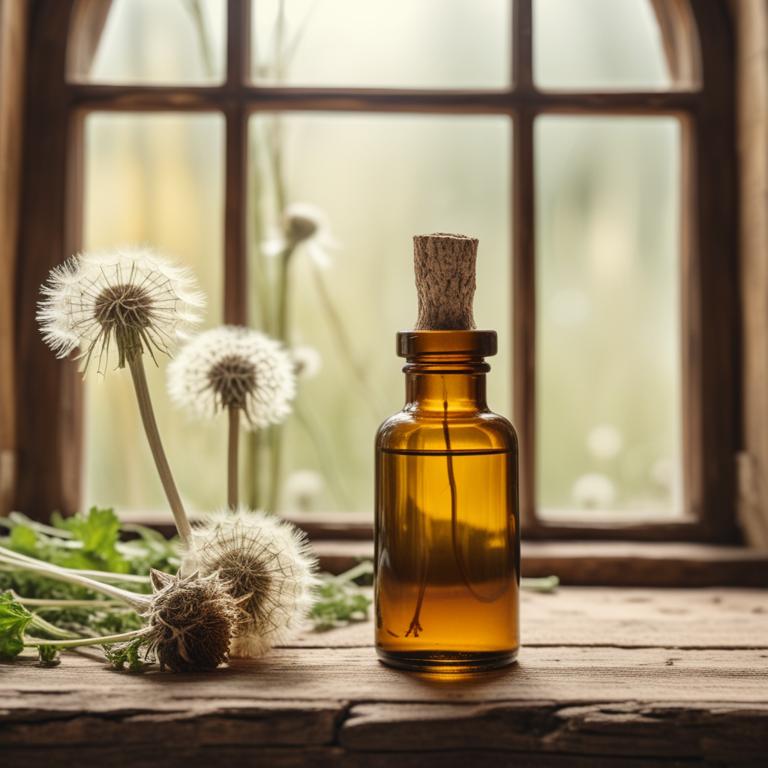
Taraxacum officinale tinctures, derived from the dandelion plant, have been used to treat upset stomach ailments due to their anti-inflammatory and carminative properties.
These properties help to soothe and calm the digestive system, reducing inflammation and alleviating discomfort.
The bioactive constituents present in Taraxacum officinale tinctures, including flavonoids, terpenoids, and sesquiterpenes, play a crucial role in treating upset stomach by regulating gut motility and improving digestion.
The benefits of using Taraxacum officinale tinctures to treat upset stomach include reduced symptoms, improved gut health, and enhanced overall well-being.
10. Althaea officinalis tinctures
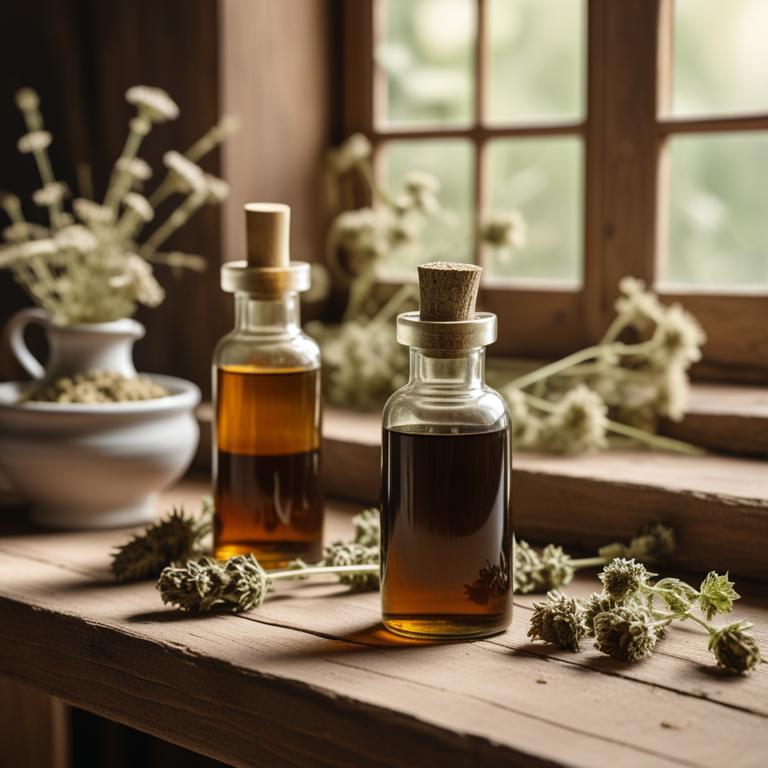
Althaea officinalis tinctures have been used for centuries to treat various gastrointestinal issues, including upset stomachs, due to their soothing and anti-inflammatory properties.
The bioactive constituents present in these tinctures, such as mucilages, flavonoids, and glycosides, help to protect and calm the mucous membranes in the stomach, reducing inflammation and discomfort.
By promoting the healing of the gastric lining and inhibiting the production of stomach acid, Althaea officinalis tinctures can effectively alleviate symptoms of upset stomachs, such as nausea, vomiting, and abdominal pain.
The benefits of using Althaea officinalis tinctures to treat upset stomachs include reduced inflammation, improved digestion, and a faster recovery time, making it a popular natural remedy for this common ailment.
11. Anethum graveolens tinctures

Anethum graveolens tinctures, derived from the seeds of the dill plant, have been traditionally used to treat upset stomach ailments due to their carminative and anti-inflammatory properties.
The bioactive constituents of Anethum graveolens, including limonene and beta-pinene, help to reduce inflammation and alleviate symptoms such as bloating and nausea.
By stimulating digestion and relieving spasms in the gastrointestinal tract, Anethum graveolens tinctures provide relief from upset stomach and promote overall digestive health.
Regular use of this herbal preparation has been shown to have benefits in reducing the frequency and severity of stomach upset episodes, promoting a sense of well-being and improved overall health.
Related Study
According to the given study, Anethum graveolens tinctures for upset stomach are likely to be beneficial due to the presence of biologically active compounds with significant spasmolytic effects.